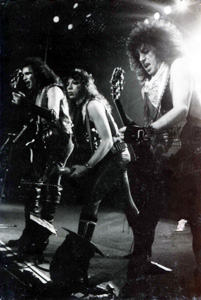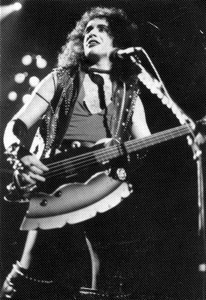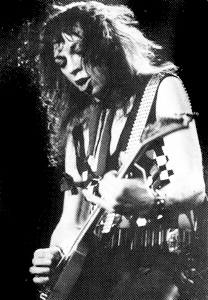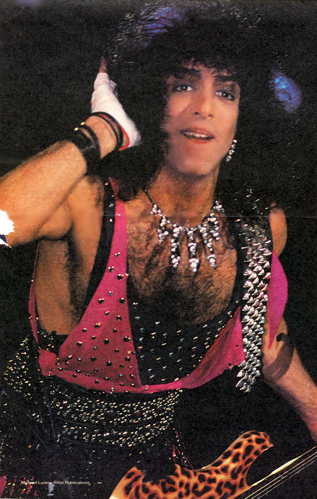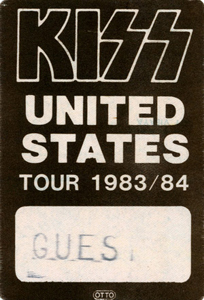
| Search JoyZine with Google Site Search! |
|
KISS Interview by Joy Williams
The show itself dissolved any lingering doubts. I use the term "show" due to the fact that such is what they present—it's not just a concert. They kept me and the rest of the audience constantly entertained throughout the entire hour-and-a-half set. Things started badly, though. Throughout Riot's and Vandenberg's sets there had been problems with the PA system, causing us to hear only the distorted sound through the monitors turned up as loudly as possible. Between sets, technical types were frantically tearing things apart and putting them back together again. On top of that, the Berkeley Fire Marshals showed up and forbade the use of half of Kiss's pyrotechnics.
All this trouble resulted in a false start for Kiss: lights dimmed, the curtain lifted, the intro music swelled, only to be cut off seconds later, with lights and curtains returning to their non-showtime levels. The crowd grew surly, with screams and chanting raising quite a din. Another ten minutes and the intro started once again. This time, it was on with the show! Smoke poured from the ceiling, billowing across the stage as the members of KISS whirled into their first number. Luckily, by this time the sound system had been returned to working order. As the set progressed, each member took his own solo. When Gene Simmons' turn came, smoke covered the stage. Nothing could be seen from the front rows except the occasional glimpse of Gene's evil-eyed face, snake-like tongue flickering. Yet, his solo seemed to keep us mesmerized, eyes never leaving the stage. Paul's was much different. He's fun, dancing all over the stage, teasing the audience and pausing for short moments to hear the fans' screams of approval. At one time, he stopped, hushed the audience, and then pointed to one side, motioning them to yell. Then the other side, and back and forth, faster, faster, faster…. The crowd loved every minute of it. Eric is perched high atop a tank at back center stage, its barrel protruding from the center, several tubes standing upright aside the machine. With occasional bursts of smoke from the tubes and lights flashing, he moves into his solo as all other members disappear from the stage. The huge tank moves to front center stage, and the occasional bursts become a constant billowing stream of smoke while the tank's huge barrel moves from side to side, aiming straight at the audience.
Vinnie takes a more serious approach, and the audience follows. He's an excellent musician in all respects, though underrated. Although he takes this moment seriously, you can tell from the occasional smile that he loves what he is doing, eyes follow him from one side of the stage to the other, never leaving his fingers as he works the guitar with such wizardry. We are satisfied. But now, back to the interview…. Only three journalists have been lucky enough to be in the right spot when management comes to get us (the rest lose out, too bad). We are escorted downstairs into a small room piled with equipment, and Paul Stanley (in a blue bathrobe and apparently nothing else) and Gene Simmons (in full leather gear) are brought in, greeting us right away with a warm "hello" and a handshake, then it's right into the interview: Q: Gene, did you have any idea last year that you would be getting rid of the makeup? GENE: No. The truth is, in the middle of the recording of Lick It Up we went down to South America and did three shows for about 300,000 people: 165,000, 135,000 and 60,000. But these were full makeup shows in Brazil and by the end of the record is when we really decided to take the makeup off. Q: You know, I've even started to read good reviews on KISS. PAUL: It scares us! Either the critics are getting good taste, or they're finally catching on.
Q: They couldn't see through the makeup before, do you think? PAUL: A lot of people tend to listen to what we write, which is a good thing and a bad thing. It's funny that when Lick It Up came out, all the people said, "Oh, they finally delivered a great album." But it's really not that different from the rest of the albums. We didn't take it up into outer space or anything; but basically we're just doing the same thing we've always done. It's strange that people think we're better than we used to be. Q: Well, let me ask you this: When you went out there tonight and all the people started screaming… GENE: I didn't realize there were people out there; I thought we were going to do a sound check. Q: Some guy screamed out, "Ah, man, you've ruined my fantasy. I've been crying. You took your makeup off. You can't do that!" PAUL: I don't think that most people's reaction has been like that. The album's been going great and the tour's going great. I think most people are really happy with the new look. Q: How do you feel when you're on stage now? GENE: Lighter! I mean, I took off about 50 pounds and Paul, about 15 or 20. PAUL: Well, the boots alone…. You get used to doing your moves with a certain amount of resistance. The first time I tried doing a kick without the boots, my leg went over my head. The show now is actually a little more energetic than it used to be. People see us now like the first time we played a show. In Europe, people were saying it couldn't be anyone else but Kiss, you couldn't go see another band and think it was us. It never as a costume party of us any more than this is a costume party. This image is just as much a part of us as the old one was. In England we were just voted No 1 Band of the Year, No 1 Album, No 1 Gig; Eric was No 2 Drummer, Gene was No 2 Bass Player, and I was the No 5 Vocalist. So, if there are a few people who are feeling a little let down, I'm sure that there are a lot who aren't. Actually, we're taking more and more off. Stick with us, by next year, we'll be nude! Q: Vinnie Vincent has been doing a lot of writing. Is he contributing music or lyrics? GENE: Sometimes riffs, sometimes the arrangements. It's good to have somebody who's not only a guitar player, but who can write songs as well.
PAUL: We like to have people around who help take a little of the work off us. You know, with us doing all the writing it's not quite as much fun, it becomes just that much more work. Eric co-wrote and actually wrote the music for "All Hell's Breaking Loose," and he also co-wrote one of Bryan Adams' songs, "Don't Leave Me Lonely." We get lazy once in awhile and it's good to have somebody boot you in the ass. We just did 12 or 14 countries in Europe before we started this tour, this one's going about three months, and then we go directly into the studio and start on another album. Our 19th. This is our 16th Gold, and will be our 12th or 13th Platinum. Q: Going back a bit here, why did you decide to start wearing makeup in the first place? GENE: It seemed like a good idea at the time. Q: And then you got caught in it? GENE: Everybody at that time was becoming "natural." The concept didn't really come into hand until about four months later when New York decided they wanted something they hadn't seen before. We were nuts. We didn't know how much it was going to cost, that we would need 8-10 trucks (14 trucks, eventually) to take the stuff across country. We decided to do everything that we never saw other bands do, and that was the premise behind the band. PAUL: I think there was a period when most bands felt they were doing the audience a favor just showing up. The audience believed that whatever the band wanted to dish out was acceptable. What we told the audience was, "You paid, and you're entitled to the best." So what we did was to pretty much elevate the audience's expectations. At this point, I don't think there are any bands that don't have to go out there and work their butts off and show the audience they're really trying, because the audience just won't take it. So, maybe in the beginning we got a lot of flack from certain groups, but it became important that a band go out on stage and do something more than have a 5 o'clock shadow and a beer belly. Q: What's interesting is that it was natural then, but now we have videos to see all these effects and costumes up close, and you've gone natural.
GENE: Well, if you become a prisoner to something you create, then you become a dinosaur and you've got to die. Now it's bad to believe that because you started something you have to continue with it. We were wearing black leather and studs when the only place you could get a studded collar was in a pet shop. We used to buy all our clothes from S&M shops in the West Village. So at this point, when we took the makeup off the last thing we wanted to do was to look like a band that was copying us. Most bands in some ways are influenced by what we've been doing, so why should we go back? Q: Do you feel you have a new direction now? GENE: I don't know if it's new or not, but once you've done everything three is to do within a medium, then you're conscience (if you've got one) tells you to go on with the times. When your conscience tells you you've already done everything in that medium, then it gets too easy, it's time to move on. Otherwise, you lose the thing that makes the next record special and the next show special. In '76 we were already doing mammoth shows with elevators and god himself making appearances. We were in competition with ourselves to put on the biggest and the best spectacle, and once you do everything in that format—and that's not to say we're going to come out with stools and acoustic guitars—then you want to make sure you don't lose that spark. If you've had 25 flash pots of explosions on stage, then 30 isn't going to make any difference. If you've done that already, then you may as well leave it to the people who are doing your thing. We don't want to be the caboose of the train. We've always felt that we were in the front, and whether it was fashionable or not, we did what we wanted to do. Q: In being in competition with yourself, did you begin to feel that you had to top the show, as opposed to the music? GENE: I think for awhile there, yeah. Not in a bad way, though. We were to the point where at the end of each tour we began thinking, "How is the next tour going to be better?" That doesn't necessarily mean that you have to have more, or that you have to bring the National Guard out on stage. You have to become better. It got to the point in '79 where we were literally going to have 24-hour events. In the daytime we'd have a circus or stalls and things to do and people could come and go as they pleased. We were trying to redraw the concept of concerts. We though, "Oh, yeah, we'll do this." But it got too much. It got to the point where we stopped playing instruments and sat down and started drawing up blueprints. Q: With 18 records out and your 19th coming up, do you ever get tired of it all? PAUL: The day we do is the day that we'll stop. It's real simple. I think that the fans have never doubted our sincerity and we certainly don't doubt theirs. When they yell and scream, it's either 'cause they've heard a lot about the band and they've got to get there and prove it, or they're there because they want to be. It's an honesty between us and the bans. At any point that they, or we, feel that it's getting a little stale, it's time to stop. If only to keep the respect up for the band, we still think it's getting better. I think you have to look at yourself and say that the show is better than it ever was, or we're coasting. Q: Well, it would take a lot of confidence and belief in yourself to completely change your image. GENE: At one point we just said, "Look, the merchandise, to a certain point, has to go. The ideas for movies and doing this and doing that have got to go." We're going to concentrate on the music. Q: I remember seeing videos of yours five years ago in Australia…. PAUL: Yeah, and the idea of MTV is around now and it's going to help a lot of bands. It's going to kill a lot of bands, too, because it's there to show if you're good or if you're bad. We're doing no more, no less. If there's a song we want to make a video of, we'll do it… And then the tour manager sticks his head in and says, "Hey, time to get ready for the show now…" And so the interview ends, whether we like it or not. Ah, well, such is the life of a rock interviewer! |

